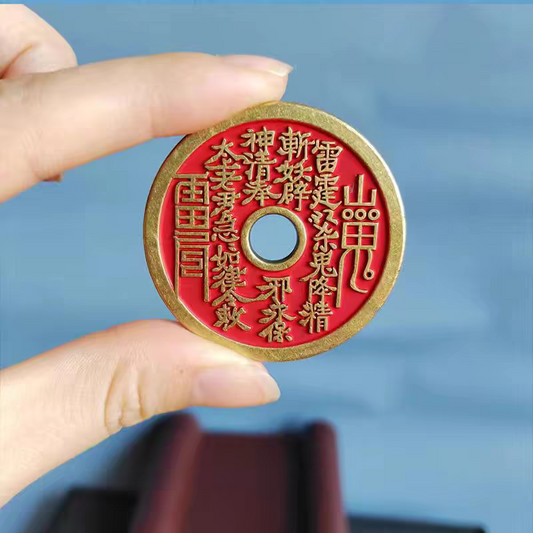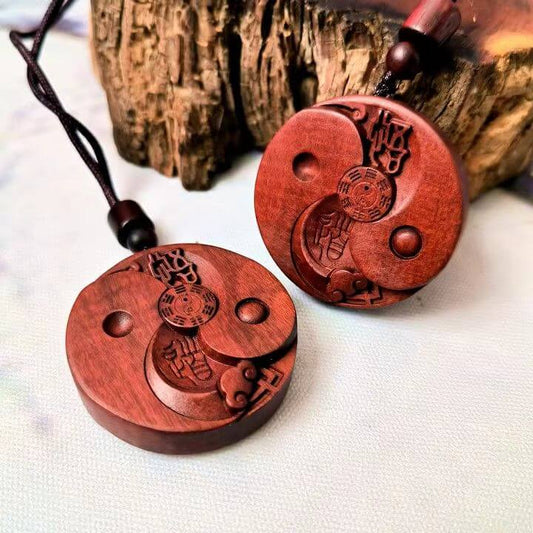
The Ideological Origins of the Taoist View of Life
paulpengPartager
The Ideological Origins of the Taoist View of Life
All religions share some common characteristics, namely, they all concern about human life, the issues of birth and death, where people come from, where they will ultimately go, and what the true meaning of human life and birth and death is, etc. Taoism is no exception. However, most religions basically focus on the level of spiritual belief, and their understandings and theories do not necessarily have to be verified through the practice of believers. Taoism has a very unique understanding of this issue, which stems from a group of people in ancient China who were specifically engaged in practical and empirical activities regarding this issue. This group of people includes the Taoists before Zhuangzi and Laozi, those who were engaged in the activities of cultivating the Tao, as well as the later Taoists.

During the Spring and Autumn Period, based on his own practical enlightenment and understanding, Laozi established a systematic theory about the natural relationship between humans and all things in the universe and how humans should respect, conform to, and follow this natural relationship. This is Laozi's "Tao Te Ching", also known as "Laozi".
In the early Warring States Period, Zhuangzi, based on his own empirical understanding, systematically, comprehensively, and incisively expounded Laozi's theory. This is Zhuangzi's "Nanhua Jing", also known as "Zhuangzi". Taoism has completely inherited the self-cultivation theories and practical methods of the Taoist sages, forming a clear understanding of life issues and a detached attitude towards the issues of birth and death. This is the Taoist view of life. This practical and empirical method is later called "Cultivating Both the Nature and the Life" or "Dan Dao". Therefore, it can be said that the Taoist view of life originates from Taoist thought.
The core doctrine of Taoist thought is the thought of nature, that is, the thought of how to correctly handle the relationship between humans and nature, namely: what is the internal relationship between humans and nature, and how humans should conform to this relationship. Under the guidance of this theory, Taoism has carried out practical activities and has long formed a set of unique understandings of life, birth, and death.
Regarding the thought of nature in Taoism, I will briefly explain my understanding. Its core content mainly consists of two aspects:

First, what Taoism is most concerned about is the "natural nature" of humans and all things in the universe and their highly unified, highly harmonious, and interdependent natural relationship.
Both humans and all things in the universe have their own "natural nature", that is, their "true features", which is actually the "nature" in Laozi's thought. The meaning of "nature" is that "self" means oneself, and "nature" means so. Humans and all things in the universe have their own original "nature", that is, "as it originally was", which is called "natural nature". Laozi called this "natural" the "Tao", or more precisely, the "Tao" that exists in "all things" as described by Laozi. The Tao exists in humans and all things in the universe, which is the "natural" or spirituality of humans and all things in the universe.
The "Tao" recognized by the academic community is "the laws of nature", which is from the perspective of academic thinking. However, from the perspective of practicing the Tao, it is not understood in this way. What people cultivate when practicing the Tao is definitely not the laws but their own "natural nature", their own "true features". Zhuangzi called this process of practicing the Tao "Shan Xing", which means renovating one's natural nature. Through practicing the Tao, people can gradually open up the realm of the Tao. Once they attain the Tao in the end, it is an extraordinary thing. Those who attain the Tao can actually have their spirituality completely detached from the physical body and become independent, that is, they can return from the "Tao existing in things" to the originally "Tao in the void". This is the "returning to simplicity and truth" of the Tao. Both humans and all things in the universe have this Tao, which is the highly unified, highly harmonious, and interdependent "natural nature". This is the natural relationship between humans and nature as mentioned in the Taoist thought of nature.
Second, all human activities must be carried out under the premise of respecting, obeying, and following this natural nature and natural relationship. Actually, this is the true meaning of "non-action", which means not to act recklessly beyond and against this "natural relationship".
Having talked about this, we probably have a clear understanding that the core content of the Taoist thought of nature includes: first, the "natural nature" of humans and all things in the universe and their natural relationship; second, respecting, obeying, and following this natural nature and natural relationship.

Regarding the thought of nature in Taoism, Laozi mainly put forward the theory in the "Tao Te Ching" but rarely elaborated on it. The systematic, detailed, and incisive elaboration is mostly in "Zhuangzi". For example, Zhuangzi believed that humans and all things in the universe are an indivisible whole, that is, the so-called "the unity of all things" theory. Since the universe and all things are likened to a whole like a human being, then, if you listen with your ears, you may think that your eyes are unimportant and casually harm them; if you look with your eyes, you may think that your ears are useless and casually harm them; if you eat with your mouth, you may think that your legs and feet are redundant and can casually harm them... These are all the most stupid things, because in the same whole, if you casually think that any part is useless, it is a limitation or obstacle to your wisdom, and if you casually harm any part, you are actually harming yourself. The Taoist view of life considers life in the context of the large whole of the universe and all things in this way.
All religions share some common characteristics, namely, they all concern about human life, the issues of birth and death, where people come from, where they will ultimately go, and what the true meaning of human life and birth and death is, etc. Taoism is no exception. However, most religions basically focus on the level of spiritual belief, and their understandings and theories do not necessarily have to be verified through the practice of believers. Taoism has a very unique understanding of this issue, which stems from a group of people in ancient China who were specifically engaged in practical and empirical activities regarding this issue. This group of people includes the Taoists before Zhuangzi and Laozi, those who were engaged in the activities of cultivating the Tao, as well as the later Taoists.

During the Spring and Autumn Period, based on his own practical enlightenment and understanding, Laozi established a systematic theory about the natural relationship between humans and all things in the universe and how humans should respect, conform to, and follow this natural relationship. This is Laozi's "Tao Te Ching", also known as "Laozi".
In the early Warring States Period, Zhuangzi, based on his own empirical understanding, systematically, comprehensively, and incisively expounded Laozi's theory. This is Zhuangzi's "Nanhua Jing", also known as "Zhuangzi". Taoism has completely inherited the self-cultivation theories and practical methods of the Taoist sages, forming a clear understanding of life issues and a detached attitude towards the issues of birth and death. This is the Taoist view of life. This practical and empirical method is later called "Cultivating Both the Nature and the Life" or "Dan Dao". Therefore, it can be said that the Taoist view of life originates from Taoist thought.
The core doctrine of Taoist thought is the thought of nature, that is, the thought of how to correctly handle the relationship between humans and nature, namely: what is the internal relationship between humans and nature, and how humans should conform to this relationship. Under the guidance of this theory, Taoism has carried out practical activities and has long formed a set of unique understandings of life, birth, and death.
Regarding the thought of nature in Taoism, I will briefly explain my understanding. Its core content mainly consists of two aspects:

First, what Taoism is most concerned about is the "natural nature" of humans and all things in the universe and their highly unified, highly harmonious, and interdependent natural relationship.
Both humans and all things in the universe have their own "natural nature", that is, their "true features", which is actually the "nature" in Laozi's thought. The meaning of "nature" is that "self" means oneself, and "nature" means so. Humans and all things in the universe have their own original "nature", that is, "as it originally was", which is called "natural nature". Laozi called this "natural" the "Tao", or more precisely, the "Tao" that exists in "all things" as described by Laozi. The Tao exists in humans and all things in the universe, which is the "natural" or spirituality of humans and all things in the universe.
The "Tao" recognized by the academic community is "the laws of nature", which is from the perspective of academic thinking. However, from the perspective of practicing the Tao, it is not understood in this way. What people cultivate when practicing the Tao is definitely not the laws but their own "natural nature", their own "true features". Zhuangzi called this process of practicing the Tao "Shan Xing", which means renovating one's natural nature. Through practicing the Tao, people can gradually open up the realm of the Tao. Once they attain the Tao in the end, it is an extraordinary thing. Those who attain the Tao can actually have their spirituality completely detached from the physical body and become independent, that is, they can return from the "Tao existing in things" to the originally "Tao in the void". This is the "returning to simplicity and truth" of the Tao. Both humans and all things in the universe have this Tao, which is the highly unified, highly harmonious, and interdependent "natural nature". This is the natural relationship between humans and nature as mentioned in the Taoist thought of nature.
Second, all human activities must be carried out under the premise of respecting, obeying, and following this natural nature and natural relationship. Actually, this is the true meaning of "non-action", which means not to act recklessly beyond and against this "natural relationship".
Having talked about this, we probably have a clear understanding that the core content of the Taoist thought of nature includes: first, the "natural nature" of humans and all things in the universe and their natural relationship; second, respecting, obeying, and following this natural nature and natural relationship.

Regarding the thought of nature in Taoism, Laozi mainly put forward the theory in the "Tao Te Ching" but rarely elaborated on it. The systematic, detailed, and incisive elaboration is mostly in "Zhuangzi". For example, Zhuangzi believed that humans and all things in the universe are an indivisible whole, that is, the so-called "the unity of all things" theory. Since the universe and all things are likened to a whole like a human being, then, if you listen with your ears, you may think that your eyes are unimportant and casually harm them; if you look with your eyes, you may think that your ears are useless and casually harm them; if you eat with your mouth, you may think that your legs and feet are redundant and can casually harm them... These are all the most stupid things, because in the same whole, if you casually think that any part is useless, it is a limitation or obstacle to your wisdom, and if you casually harm any part, you are actually harming yourself. The Taoist view of life considers life in the context of the large whole of the universe and all things in this way.









